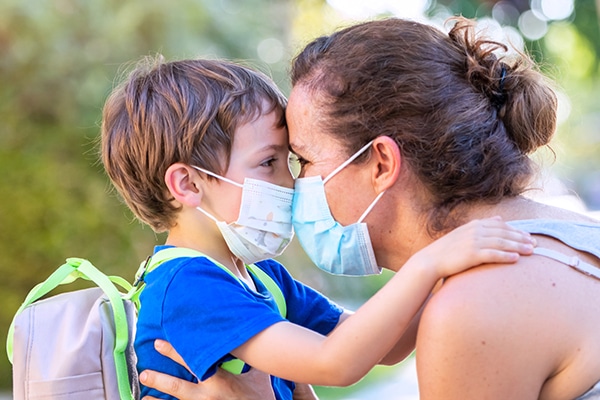- Parenting
A roadmap for parents by Dr. Madeline Levine, psychologist, bestselling author, and Expert Panelist at JFCS’ Center for Children and Youth.
As they pose for their first day of school photos, children and parents have more concerns than ever about returning to classrooms this fall. Parents are worrying—will my child survive socially? Are they behind academically after learning from home? Is my child’s back-to-school anxiety cause for alarm?

We sat down with parenting expert Dr. Madeline Levine to discuss families’ rising concerns about heading back to school. Based on her deep experience, and on insights from her recent book Ready Or Not: Preparing Our Kids to Thrive in an Uncertain and Rapidly Changing World, Dr. Levine’s key advice to parents is that while the uncertainty is challenging for everyone, the way parents handle this transition will matter greatly for their kids.
“There has never been a time like this, but there is a lot of research about how kids get through traumatic situations and stress,” Dr. Levine says. “The first thing we know is that the extent to which you, the parent, are taken care of is the extent to which your child will be OK.”
So how can parents navigate this challenging transition? Dr. Levine shares a roadmap to create an environment in which kids can thrive:

Dr. Madeline Levine is a psychologist, bestselling author, and Expert Panelist at JFCS’ Center for Children and Youth
-
Work first on managing your own anxiety.
Feeling nervous about your child’s return to school is normal, but the first step to helping your child through the transition is to maintain a positive attitude about the situation yourself.
“The best predictor for a child’s stress is the child’s perception of how difficult something is; so when parents exude that this is going to be hard, kids pick up on it,” Dr. Levine says. “Once you make the decision to start school in person, you then have to go into it with confidence.”
-
Rethink the metrics for academic “success.”
Dr. Levine has long been advising parents that when we place a heavy focus on academic metrics, perfection, and being “the best,” we too often miss promoting the kinds of skills that kids need most for both mental health and academic achievement.
As anxiety runs high about the impact of a “lost year” of school, shifting our focus to helping kids develop social and emotional skills will actually serve them best—now and into the future.
“When we look at how kids have fared during COVID-19 so far, we see that skills like creativity, perseverance, and flexibility have been the most useful in getting through it,” Dr. Levine says. “And when I talk to CEOs about what they’re looking for in new employees today, they are seeking these same qualities.”
-
Model optimism and resilience for your children.
So how can parents help to cultivate the skills that their children need to thrive? Dr. Levine reminds us that “there is no resilience gene” and that modeling calm, positivity, and perseverance is critical to helping our children adapt to these challenging times.
Dr. Levine shares the following recommendations for parents:
- Send your kid off with a smile and tell them to have a great day. Avoid overdoing statements like, It’s going to be hard. Let me know if you’re uncomfortable. These can provoke more anxiety.
- Talk to your kids on their developmental level. For young kids, for example, explain simply that we wear masks and practice social distancing to keep everyone safe. For teens, you can explain more of the complexities of the situation.
- Communicate the positive side of things, even if you or your child feel overwhelmed. For example: Of course you’re feeling anxious today, it’s the first day of school. I think you’ll feel better once you get through it.
View modeling calm, optimism, and adaptability for children as something to keep working at. “It takes practice,” Dr. Levine tells parents. “Fake it until you make it.”
-
Protect yourself from things that produce extra fear and anxiety.
Kids will pick up on the fear they see in the media, or in the conversations adults have between themselves. And for parents, consuming a constant news cycle about the spread of COVID, political tensions, or the many other heartbreaking events in the world will only produce more angst and worry. To help reduce anxiety in your household, make conscious choices about the media and the conversations you expose your family to.
Most of us, and most of our children could use less media exposure. Dr. Levine recommends, “Include your older kids in discussions about what to reduce and why. Having some sense of control is an antidote to the feeling of being ‘out of control’.”
-
Trust yourself to know when there really is a problem.
Dr. Levine reassures parents, “So many articles right now focus on what has been lost, and how kids are struggling. While there is truth in them, the bigger truth is that most kids are going to be OK.”
How will parents know if their child is really struggling as they return to school this year? First, look back to the beginning of this roadmap: when parents find ways to effectively manage their own anxiety, and when thinking clearly, they will be able identify prolonged or extreme behaviors that indicate their child is in distress. For example, a teen in bed for two days is not necessarily of concern, but a teen in bed for two weeks, is. Look at the duration and intensity of symptoms.
“Parents, the first order of business is you,” says Dr. Levine.
And if you or your family are struggling with anxiety, don’t hesitate to reach out for help. JFCS’ Center for Children and Youth is here to support you with everything from parent coaching and guidance to expert mental health services for kids and teens.
For more guidance from Dr. Levine, read her book Ready Or Not: Preparing Our Kids to Thrive in an Uncertain and Rapidly Changing World.
Learn how JFCS’ Center for Children and Youth can support your family >
JFCS’ Center for Children and Youth is made possible through fees for services and generous donations from individuals, foundations, and corporations. Leadership support for this community-wide initiative is also provided by the Koret Foundation. Donate now >
